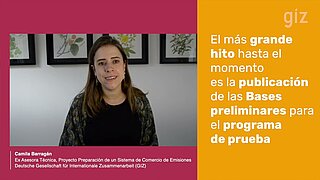Preparation of an Emissions Trading System (ETS) in Mexico
Mexico intends to involve the private sector in the implementation of its NDCs through the introduction of an Emissions Trading System (ETS). However, there is still a lack of expertise and institutional capacity to continue the development of and implement an ETS. Therefore, the project creates the institutional and technical conditions to be met by stakeholders from the public and the private sector and civil society. In doing so, the project develops knowledge-based recommendations for action to guide the Mexican decision-making processes on ETS design. The project strengthens the different stakeholders involved through capacity development and promotes cooperation between them. Besides, the project relies on international knowledge transfer to enable the Mexican stakeholders to learn from other countries and regions that already have an ETS and to disseminate the lessons learned in Mexico.
- Countries
- Mexico
- IKI funding
- 6,200,000.00 €
- Duration
- 09/2017 till 02/2025
- Status
- open
- Implementing organisation
- Deutsche Gesellschaft für Internationale Zusammenarbeit (GIZ) GmbH
- Political Partner
-
- Ministry of Environment and Natural Resources (SEMARNAT) - Mexico
- Implementing Partner
-
- Ministry of Environment and Natural Resources (SEMARNAT) - Mexico
State of implementation/results
- Building on the work of the Climate Alliance and with the support of the project, the amendment to the Climate Law (LGCC) came into force in July 2018, which provides for the introduction of an emissions trading system (ETS) and a three-year pilot phase from 2019. The results of the project's technical and legal advice were incorporated into the development of the legal framework and negotiations with the private sector. The project is currently supporting an active exchange on technical aspects of the ETS within the framework of the Consultative Committee on the Emissions Trading Scheme (COCOSCE) between key stakeholders from government, economy, science and civil society.
- During 2023, several Mexican states have started collaborating with the project on their own carbon pricing instruments (especially carbon taxes). The aim is to use different instruments at state and federal level in a coordinated manner and in the interests of effective climate protection.
- In the last quarter of 2023, the project launched a forum for dialog between the central government and the environmental authorities of 22 states on carbon pricing instruments in Mexico. In addition to the Ministry of Environment, the Ministry of Finance also participated in the inter-institutional exchange on the part of the federal government. By February 2024, the forum had already convened twice.
- The project has commenced the development of a study on carbon pricing in Mexico, which will complement a guide for subnational carbon taxes. Both documents, scheduled for release in 2024, are intended to support federal and subnational authorities in the development, design, and implementation of their carbon pricing instruments.
- From June to October 2023, the project advanced exchanges on Mexico's experiences with the ETS through events held in Mexico and internationally. These events included the Sustainable Financing Festival in Mexico City, the Latin American Climate Summit in Panama, the Mexico Carbon Forum in Querétaro, Mexico, and an event as part of the Latin America and the Caribbean Climate Week of the United Nations Framework Convention on Climate Change.
- From April 2022 to February 2023, legislators from the Mexican Chamber of Deputies and the Senate participated in three high-level information sessions on the Emissions Trading System organized by the initiative, engaging in a dialogue on the perspectives of this climate protection instrument. The events, which involved a total of 118 participants, were held in collaboration with the civil society organization POLEA.
- Between 2017 and 2022, three editions of the ETS Academy, a multi-week training format on technical, economic, and political aspects of emissions trading, were organized. Over 270 individuals have participated in the ETS Academy, which is scheduled to take place again in 2024.
- Since February 2022, the initiative has been advising SEMARNAT regarding the regulation for the implementation phase of the ETS, scheduled to come into effect in 2024. Important technical studies were conducted between 2021 and 2023 for this purpose. Thematic focuses of the studies include setting emission caps, competitiveness of participating companies, allocation of emission rights, and feasibility of benchmarking analyses.
- In the first quarter of 2021, anti-corruption training sessions involving the German Emissions Trading Point (DEHSt), SEMARNAT, and companies participating in the ETS were conducted. Simultaneously, in collaboration with the EU and BMU-funded SPIPA project and the European University Institute (EUI), four exchange events on European experiences with the design and implementation of the ETS were organized, attended by SEMARNAT, the private sector, and Mexican research institutions.
- In June 2022, the project released a video on the Mexican ETS and the role of the initiative. The video is available in Spanish.
Latest Update:
04/2024
Further links
- Dialogue on carbon pricing instruments to promote climate action (Jul. 2023) (ESP)
- Presentation book: ETS Academic Book presentation event (Jul 2022)
- Article: Legislative Dialogue on the Mexican ETS – Deputies Commission for Climate Change (Jan 2023) (ES)
- Article: Second Edition of the Training on the ETS for regulated sectors in Mexico (Jan 2023)
- Article: Results presentation of the "Competitiveness analysis and allocation mix for the Emissions Trading System" (SEMARNAT & private sector representatives) (Feb 2023) (ES)
- From Querétaro to Panama: Dialogues to promote effective carbon pricing instruments (ESP)
- Contribution: Legislative Dialogue on the Mexican ETS – Senate Commission for Environmental, Natural Resources and Climate Change (Mar 2023) (ES)
- National and Subnational Synergies: Interinstitutional and State Dialogue on Carbon Pricing Instruments. (ESP)
- Article: ETS 2022 Academy
- Article: Towards an Operational Phase of the Emission Trading System in Mexico (ESP)
- Article: Virtual sessions and results on Accountability and Transparency in the Mexican ETS (Apr. 2021)
- Article: Accelerating the transition to a green future: Reflections on Latin America Climate Week 2023 on carbon pricing instruments (ESP)
- Book: Towards an Emissions Trading System in Mexico: Rationale, Design and Connections with the Global Climate Agenda (EN)
- Article: ETS Board Game
- Article: ETS Academic Book presentation event (Jul 2022)
- Article: Second Edition of the Training on the ETS for regulated sectors in Mexico (Jan 2023
- Article: Legislative Dialogue on the Mexican ETS – Deputies Commission for Climate Change (Jan 2023) (ES)
- Article: Results presentation of the "Competitiveness analysis and allocation mix for the Emissions Trading System" (SEMARNAT & private sector representatives) (Feb 2023) (ESP)
- Blog entry: Legislative Dialogue on the Mexican ETS – Senate Commission for Environmental, Natural Resources and Climate Change (Mar 2023) (ESP)
- Video: Mexican ETS video (You tube) (ESP)
- Article: ETS 2022 Academy
- Article: Virtual sessions and results on Accountability and Transparency in the Mexican ETS (Apr. 2021)
- Article: Study Trip to Germany 2019
- Article: Launch of the ETS Pilot Phase (ES)
- Brochure Mexican ETS Pilot Program
- Article: Private Sector Cooperation (ES)
Project relations
Legend:
The link has been copied to the clipboard




